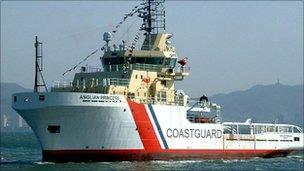Nautilus union warns over emergency tug cuts
- Published

The four tugs which are under threat include the Anglian Princess.
The government is risking lives with its plan to axe four emergency towing vessels, maritime union Nautilus says.
The Department for Transport said last week that scrapping the tugs, used when vessels break down, would save £32.5m over the next four years.
Nautilus said the government was "gambling with lives, the environment and with safety at sea".
But the department said funding the vessels, known as ETVs, was not a "correct use of taxpayers' money".
The Maritime and Coastguard Agency will stop providing the emergency tugs with effect from September 2011.
The ships are based in Falmouth, Dover, the Northern Isles and Western Isles.
The tugs - Anglian Prince, Anglian Princess, Anglian Sovereign and Anglian Monarch - are chartered by the agency for use in pollution control and towing vessels that are in difficulty.
The government said the salvage and clean-up of stricken vessels should be the responsibility of companies and their insurers.
ETVs were introduced after the Braer tanker disaster off the coast of Shetland in 1993.
One of the them assisted when the nuclear submarine HMS Astute ran aground in Scotland on Friday.
'Running a risk'
Nautilus general secretary Mark Dickinson said: "The thinking behind this is utterly incomprehensible and we will do all that we can to persuade the government to reconsider.
"The ETVs were put in place for extremely good reasons, following reports into two terrible tanker disasters, and their success has proved to be a model for other countries.
"The number of recent incidents and near-misses in the Channel alone serves to demonstrate the value of these vessels and it is clear that the government is running a significant risk in removing the protection they provide."
Nautilus is also protesting at the government's announcement that the future of the Maritime Incident Response Group (MIRG) is also undecided as part of the cost-saving programme. Scrapping it would save £340,000 a year.
Ministers said MIRG, launched in 2006 to provide a co-ordinated national network of trained personnel to respond to fires, chemical releases and other accidents at sea, was being reviewed.
Mr Dickinson said: "The proposed savings represent a drop in the ocean in terms of the overall DfT budget but the loss of these services could make the difference between life and death or a major environmental disaster."
- Published20 October 2010